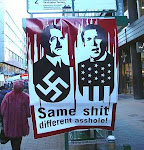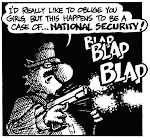By John F. Burns
The New York Times
Friday 28 December 2007
Benazir Bhutto, who was assassinated at age 54 on Thursday in the Pakistani city of Rawalpindi, spent three decades navigating the turbulent and often violent world of Pakistani politics, becoming in 1988 the first woman to be democratically elected to lead a modern Muslim country.
A deeply polarizing figure, the self-styled "daughter of Pakistan" was twice elected prime minister and twice expelled from office amid a swirl of corruption charges that ultimately propelled her into self-imposed exile in London, New York and Dubai for much of the past decade. She returned home only two months ago, defying threats to her life as she embarked on a bid for election to a third term in office, billing herself as a bulwark against Islamic extremism and a tribune of democracy.
The combined bombing and shooting attack that killed her as she left a political rally, standing through the open roof of her car to greet milling crowds of supporters, came as Ms. Bhutto staged a series of mass meetings across Pakistan. She did that despite her aides' appeals for caution in the wake of a double suicide bombing that narrowly failed to kill her on the night of her return from exile in October. That attack, which killed more than 130 people, came as she drove from the airport in Karachi to her home on the city's seafront, and provoked a characteristic response.
"We will continue to meet the public," she said as she visited survivors of the bombings at a Karachi hospital. "We will not be deterred."
When asked to explain the courage - or stubbornness, as some of her critics saw it - that she displayed at critical junctures in her political career, Ms. Bhutto often referred to the example she said had been set by her father, Zulfikar Ali Bhutto. He was a charismatic and often demagogic politician who was president and prime minister from 1971 to 1977, before being hanged in April 1979 on charges of having ordered the murder of a minor political opponent.
Mr. Bhutto was the founder in 1967 of the Pakistan Peoples Party, the political vehicle that he, and later his daughter, rode to power. Like his daughter, Mr. Bhutto battled for years with Pakistan's powerful generals. He was ousted from office, and ultimately executed, on the orders of Gen. Mohammad Zia ul-Haq, one of the long succession of military rulers who have dominated Pakistan for nearly 40 of the 60 years since it emerged as an independent state from the partition of British India.
Under house arrest at the time, Ms. Bhutto was allowed to visit her father before his execution at Rawalpindi's central prison, only a short distance from the site of the rally where she was killed nearly three decades later. In a BBC interview in the 1990s, she said seeing her father preparing to die steeled her for her own political career, which some biographers have suggested was driven, in part, by a determination to avenge him by outmaneuvering the generals.
A History of Violence
Violence ran like a thread through her family life, to an extent that caused her admirers to compare the Bhuttos, in the contribution they made to Pakistan's political life, and in the price they paid for it, to the Kennedys - and her enemies, pointing to the Bhuttos' bitter family feuds, to compare them to the Borgias. The younger of Ms. Bhutto's two brothers, Shahnawaz, died mysteriously of poisoning in 1995, in an apartment owned by the Bhuttos in Cannes, France. French investigators said they suspected that a family feud over a multimillion-dollar inheritance from Zulfikar Bhutto was involved, but no charges were filed.
Ms. Bhutto's other brother, Murtaza, who along with Shahnawaz founded a terrorist group that sought to topple General Zia, spent years in exile in Syria beginning in the 1980s. When Murtaza finally returned to Pakistan, in 1994, he quickly fell into a bitter dispute with Ms. Bhutto over the family's political legacy - and, he told a reporter at the time, over the money he said his father had placed in a Swiss bank when he was prime minister. In 1996, Murtaza was gunned down outside his home in Karachi, and his widow, Ghinva, blamed Asif Ali Zardari, Ms. Bhutto's husband. Ms. Bhutto's Iranian-born mother, Nusrat, sided in the dispute with Murtaza, and was dismissed by Ms. Bhutto as the Peoples Party chairman. "I had no idea I had nourished a viper in my breast," she said of her daughter at the time.
Born on June 21, 1953, Ms. Bhutto, the first child in her family, reveled in telling friends that she was her father's favorite. One of her most cherished anecdotes about her childhood involved her father's encouraging her to set aside traditional Muslim views of a woman's role and to have ambitions beyond the home, a message she said he conveyed with stories about Joan of Arc and Indira Gandhi.
After attending a private Christian-run school in Karachi, where the family maintained a luxurious mansion, Ms. Bhutto studied at Radcliffe College, earning a Harvard B.A. in 1973, and later at Oxford, where she gained a second B.A. in 1976. At Oxford, she was the first woman to become president of the Oxford Union, the prestigious debating society that nurtured several British prime ministers.
In her memoir, she described what life as a young woman at Harvard felt like. "I was amongst a sea of women who felt as unimpeded by their gender as I did," she wrote. At Oxford, she adopted a Westernized way of life, spending winters at the Swiss ski resort of Gstaad. She said later that her passions at the time included reading royal biographies and "slushy" romances, and browsing at the London department store Harrods - a habit she maintained throughout the rest of her life.
From Oxford, Ms. Bhutto was thrust abruptly into the heart of Pakistani politics by General Zia's arrest of her father in 1977, and by his execution 18 months later. Ms. Bhutto wrote in her memoir of her last meeting with her father, through a metal grille at the Rawalpindi Prison. "But I did not cry. Daddy told me not to," she recalled.
From that moment on, Ms. Bhutto said in later years, she resolved to oust General Zia from power. But in August 1988, the general and the American ambassador, Arnold L. Raphel, were killed when their military plane exploded and crashed in southern Pakistan. Three months later, when she was 35, Ms. Bhutto won a general election and formed her first government, only to be ousted by Pakistan's president in 1990, having served less than half her term. In 1993, she won a second election, but was again dismissed in 1996.
Her accomplishments in office were few. She claimed in later years that she had clamped down on Islamic militants, established a strong basis for democracy by paring away many of the restrictions on civil liberties imposed by the generals, and provided a boost to the economy, especially in her second term, by attracting a flow of foreign investment. But on both occasions, she was dismissed, under pressure from the military on charges of corruption and incompetent governance. Her ouster, on both occasions, sparked only sporadic protests across Pakistan.
Complexity and Contradictions
A woman of complex and often contradictory instincts, Ms. Bhutto was a politician who presented herself on public platforms as the standard-bearer for Pakistan's impoverished masses, for civil liberties and for an unfettered democracy. But she made enemies with her imperious and impulsive manner as prime minister in dealing with government officials, diplomats and reporters, and by what her critics described as an instinct for political vindictiveness. She recalled how her father taught her the importance of deceit in politics, lessons she said she had rejected in favor of openness. But American officials were troubled by her account of her role in Pakistan's secret nuclear weapons program. She maintained in recent years that the Pakistani military had kept her in the dark about the weapons program, and that the first she knew of it was in a CIA briefing in Washington in 1989.
In an interview two years ago for a documentary produced by The New York Times and the Canadian Broadcasting Company, she said she also did not know, when in office, that A. Q. Khan, the head of the Pakistani nuclear program, was selling nuclear technology to other states, including Libya and North Korea. But according to accounts given by Dr. Khan's associates, Ms. Bhutto, after visits to North Korea in the 1990s, returned to Islamabad with North Korean missile designs intended to be mated to the Pakistani bomb.
In "Daughter of Destiny," her 1989 memoir, she rebuked reporters for calling attention to her dress, almost always the traditional loose-fitting robe favored by Pakistani women, saying she did not care about matters like dress. But among her aides and Pakistani diplomats, who often accompanied her on shopping trips abroad, she gained a reputation for buying expensive jewelry and shoes and at elite stores in Beverly Hills, London and Paris.
Her critics often attributed her flushes of haughtiness and her expensive tastes to a sense of entitlement, as Zulfikar Bhutto's daughter and as the pre-eminent member of a wealthy land-owning family from the cotton-growing southern province of Sindh. The egalitarian credo Ms. Bhutto preached as a politician found little echo in the lives of the impoverished men and women, many of them indentured workers, who worked the family's ancestral lands.
After her second dismissal from office in 1996, a friend said Ms. Bhutto's sense of herself as inseparable from the fate of Pakistan contributed to actions that led Pakistani investigators to accuse her and Mr. Zardari of embezzling as much $1.5 billion from government accounts.
British and American private investigators working for the government of her political rival Nawaz Sharif, produced a thick volume of documents tracing what they said were multimillion-dollar kickbacks paid to the couple in return for the award of government contracts, and a web of bank accounts across the world that were used to hide the money. Ms. Bhutto and Mr. Zardari vehemently rejected the allegations, saying their accusers wanted to drive her from power.
Criminal probes of the couple's financial dealings were opened in Britain, Spain and Switzerland, among other places. But the cases against the couple in Pakistan languished for years in the courts, and the cases against Ms. Bhutto were ultimately quashed by an amnesty granted by Pakistan's president, Pervez Musharraf, as part of an American-brokered deal that cleared the way for Ms. Bhutto to return to Pakistan in the fall to participate in elections that Mr. Musharraf set for January.
The American bid to restore her to power in Islamabad reflected her tireless efforts to maintain a network of the powerful among the political media elite in Washington and in London.
Among her friends, Ms. Bhutto's marriage to Mr. Zardari, who was in Dubai when she was killed, was seen as central to understanding much that went awry in her life in the years after her father was hanged. The marriage in 1987 was an arranged one, in the Muslim tradition; her mother acted as marriage broker. Mr. Zardari came from a modest business family that owned a cinema.
Ms. Bhutto herself spoke soberly of what an arranged marriage entailed, saying that her five years under house arrest - and, briefly, in prison - under General Zia, had left her with little opportunity for courtship. But friends watched with fascination as her relationship with Mr. Zardari developed. Handsome, with a macho style that Ms. Bhutto told friends she thought at first was ridiculous, he became an important figure in her two governments, serving in her cabinet in her second term in a role that gave him a major role in approving foreign investment.
Mr. Zardari's nickname among Pakistanis, Mr. 10 Percent, spoke for the widespread sense that he had led Ms. Bhutto into the financial irregularities that played an important role in her decision to go into exile. Mr. Zardari, arrested before she left, spent eight years in jail but never faced trial and was freed by Mr. Musharraf and eventually allowed to leave Pakistan. Ms. Bhutto never wavered in defense of her husband. "Time will tell he is the Mandela of Pakistan," she said. The couple had two sons, Bilawal and Bakhtwar, and a daughter, Aseefa. Bilawal, 19, began studies in the fall at Oxford. The two younger children remained with their father in Dubai.
--------
Reporting was contributed by David E. Sanger, Jane Perlez, David Rohde and Helene Cooper.
Go to Original
List of Suspects, but Killers May Never Be Found
By Rory McCarthy
The Guardian UK
Friday 28 December 2007
Investigation made more difficult by sheer number of former PM's many enemies.
There were death threats even before Benazir Bhutto returned to Pakistan two months ago after years in self-imposed exile. But who was behind her assassination yesterday? The list of those who may be implicated is long and, in the end, the truth may never emerge.
Islamic Militants
The most obvious suspects must be religious militants. The very nature of the attack, death by shooting and a suicide bombing in a public place with many casualties, seems to point the finger. There were death threats before Bhutto touched down in Pakistan in mid-October. One Taliban commander threatened to send a squad of suicide bombers to kill her. Other militants made similar threats, saying she was a target because of her perceived close relationship with the west and with the US in particular.
After the suicide bombing in Karachi on the day of her return, which left 138 of her supporters dead and another 300 injured, Pakistani officials said they had intelligence reports warning that at least three groups connected with al-Qaida or the Taliban were plotting to kill her. But if the killers were militants, it does not mean that they had a direct connection to al-Qaida, or Osama bin Laden, or even the Taliban leadership.
A multi-headed militancy - a web of cells and informal networks - is well-established across Pakistan and some areas of Afghanistan, the ever-more violent blowback of the Afghan war against the Soviets in the 1980s and Pakistan's long conflict with India in Kashmir. Hundreds of Pakistanis have died this year in a long and brutal campaign by a revitalised militant movement desperate to challenge the authority of the government in Islamabad. They would have seen Bhutto, with her western links and her very public determination to crack down on religious extremism, as a threat to their existence.
The Military
After the first assassination attempt in October, Bhutto spoke plainly about who she believed wanted her dead. "I know exactly who wants to kill me. They are dignitaries of General Zia's former regime who are behind extremism and fanaticism," she told the French magazine Paris-Match. Later she blamed "closet supporters" of the militants and spoke of her fear that retired military men wanted her dead. She pointed an accusing finger at the army's powerful intelligence arm, the Inter-Services Intelligence agency.
The military, and General Zia ul-Haq in particular, have long been her family's nemesis. Zia unseated her father in a coup in 1977 and hanged him two years later; for years there has been a bitter rivalry between Bhutto and the Pakistani military. While she was in exile, Pervez Musharraf, the general-turned-president, accused her of corruption and mismanagement. She in turn accused Musharraf of squeezing out democracy and last month described him as "contaminated". Yet she stopped short of accusing him directly of involvement in the assassination attempts against her.
Bhutto said that days before the October bombing she had sent Musharraf a letter warning of several different bomb plots against her, including names and telephone numbers of suspects. "I'm not accusing the government. I'm accusing certain people who abuse their powers," she said after that first attack. There certainly may be some within Pakistan's military or among retired officers who regarded Bhutto as a primary threat to their power and the stability of Pakistan, but without hard evidence of their involvement it will be difficult to make mere suspicions stick.
Political Opponents
Bhutto has fought a long battle with her political rivals, notably Nawaz Sharif, the former prime minister and head of the Pakistan Muslim League (PML) who has also recently returned from exile. His support on the ground in Pakistan is strong and relations between the two rival movements are rarely cordial. After the October suicide bombing, one PML official accused Bhutto's husband, Asif Ali Zardari, of staging the bombing to win sympathy for his wife. But, however bitter the competition, they look like the least likely culprits.
Will We Ever Know?
Pakistan's detective work at the scene of a crime is not typically rigorous and even if yesterday's bomber is identified it would probably stretch the world's finest investigators to determine who ordered the killing.
Even if a militant group did dispatch the bomber, were they operating alone or as pawns of more powerful figures? Even today, the one other infamous assassination in Pakistan's history, the killing of Zia in August 1988, remains the unsolved subject of many a conspiracy theory.
----------
Benazir Bhutto
28.12.2007: Obituary
27.12.2007: Profile: Moderniser, moderate, martyr
Video
After Bhutto
Brown pays tribute to Bhutto
In pictures
The life of Benazir Bhutto
Timelines
27.12.2007: Key events in the life of Benazir Bhutto
19.11.2007: Instability in Pakistan
Who did it?
27.12.2007: Suspects in the Bhutto assassination
Jason Burke analysis
Interactive
Pakistan's political crisis
More on Pakistan
27.12.2007: What next for Pakistan?
27.12.2007: Pakistan: a troubled history
Pakistan special report
Go to Original
Interview With Former US Intelligence Official on Bhutto Assassination
By Laura Rozen
Mother Jones
Thursday 27 December 2007
I interviewed a former U.S. intelligence official knowledgeable about Pakistan about the assassination today in Rawalpindi of Pakistani opposition leader and former prime minister Benazir Bhutto. While his comments make clear Bhutto was an inrreplaceable political figure in the country, and that her political party cannot exist in the same way without her, he also emphasized his belief that Pakistan and its institutions are far more resilient and disciplined than many people in the West may understand. Here is a summary of the interview:
Former U.S. Intelligence Official (FUSIO): Let us never forget that at least in my lifetime we had two presidents shot and one died, and a likely Democratic presidential candidate Bobby Kennedy killed and Martin Luther King Jr., all in rapid succession. Before we jump in and [scream that Pakistan is a failed nuclear state] and draw conclusions about collusion. If some guy has one hand on a lanyard and the other on a gun, and he's willing to blow himself up, whether it's in Washington or Rawalpindi, if he gets through, he can do his dirty job. It's a conspiracy theorists' dream. …
Mother Jones: There's no doubt that it was some form of Al Qaida who was behind this?
Fusio: I hate to use that word [because it's not precise]. "Al Qaida" and the "Taliban" - everybody [in the West] can even spell them both. But it is that crowd - militant Islamists.
The point is, Bhutto had two things against her: who she was, regardless of the claims that she could reach out to people better than anyone else. [Bhutto's father, Zulfikar Ali Bhutto, was Pakistan's first popularly elected prime minister].
The other thing against her is that it is never good for a foreign leader to be perceived as the darling of the American government. I am talking about perception, not necessarily the reality. I've been back to Pakistan a couple times recently. The belief not just among the people on the streets, but among the elites, is that America was delivering Bhutto to Pakistan, to lead a coalition government. Whether it's true or not, every time the plan hit a bump, [deputy secretary of state John] Negroponte was in Pakistan. In terms of perception, there are no coincidences in South Asia.
Mother Jones: What now for Washington's policy?
Fusio: My sense is that the American government can send sympathy and condolences and condemn the assassination, and then should shut up.
The next big test is, do we have the election [Pakistani parliamentary elections were scheduled for January 8].
If I were [President Pervez] Musharraf, I would say, tough it out, have elections. People are saying, will he call martial law. If he picks up phone and calls his old "house," Army house, and asks for martial law, they will tell him, "Thank you for your sentiments on this, I will get back to you." Does Musharraf call martial law? Can he?
Mother Jones: There is no opposition leader of that stature who can replace Bhutto?
Fusio: There are no real political parties in Pakistan. Bhutto was the Pakistan People's Party. If your daddy founds the party, he was made chairman of the party for life, he get killed. The daughter was made the leader of the PPP for life. If you ask anybody to describe party [the PPP], they answer with only one word: Bhutto.
Now, the question, is there a political party after tomorrow? If you jumped and shouted out Aitzaz [Ahsan] - he is the guy, the defender lawyer for the Supreme Court Justice [and a member of the PPP], if you shouted his name, people would say "huh?"
Mother Jones: What now? Does this help Nawaz Sharif?
Fusio: Nawaz's return [from exile in Saudi Arabia] was not the biggest event that everyone thought it was.
Now it is highly unlikely that any of three political parties will be able to form a coalition government. Even absent this, it was unlikely that any … could achieve the majority required majority for governing. Now that this [assassination] is thrown into the mix, it is even more unlikely.
Mother Jones: Does anyone benefit from this?
Fusio: I won't say who benefits because that implies guilt.
.
What we'll get out of this probably, is there really a Pakistan People's Party that can become a real party? There are no real parties in Pakistan. Except perhaps for the MMA (the coalition of Islamist groups.)
Mother Jones: You don't sound terribly alarmed.
Fusio: I'm not. We can do without the media reports that scream that "Pakistan is a failed nuclear state." I think there is a lot more resilience and discipline within [Pakistani] institutions than we like to believe.
-------
Hello NORML Supporters!



















